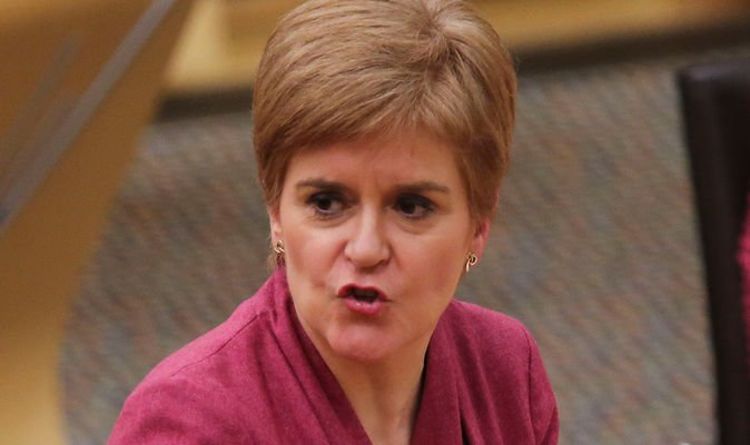Nicola Sturgeon 'regurgitated SNP pledges' says Wells
We use your sign-up to provide content in ways you’ve consented to and to improve our understanding of you. This may include adverts from us and 3rd parties based on our understanding. You can unsubscribe at any time. More info
Scotland’s public finances have hit an unprecedented low due to the coronavirus pandemic. The official Government Expenditure and Revenue Scotland (GERS) report revealed the gulf between money spent on public services and income raised from taxes north of the border more than doubled in 2020/21 to £36.3billion, almost as much as the entire Holyrood budget. The country’s deficit for 2020-21, after a geographic share of UK North Sea oil and gas tax revenues was included, rose to 22.4 percent of gross domestic product.
This compared with a deficit of 14.2 percent for the UK as a whole.
The data also showed a relative fiscal weakening for Scotland. In the year to April 2020, Scotland’s deficit was 8.8 percent of GDP, compared with 2.6 percent for the UK.
Kate Forbes, Scotland’s finance secretary, insisted the data on the deficit would not stop the SNP turning its focus back to independence after the coronavirus crisis.
She said: “It is not an obstacle to making the case for independence because deficits across the world have risen exponentially.”

Scottish First Minister Nicola Sturgeon added the “fiscal position was a result of how we are governed in the UK” and having a deficit was “not a barrier to any country being independent”.
In a recent report, John Ferry, a contributing editor for the think tank These Islands and a former financial journalist, claimed that in a reasonable world Ms Sturgeon and her colleagues would look at the GERS numbers and be no more inclined to sever Scotland from its financial support structures than the Prime Minister would the UK.
However, he noted, the SNP are instead in “denial of reality” and have “a religious-like commitment to the cause”.
He explained: “We need only think for a moment about the consequences of Scotland leaving the UK in 2016 (if the nationalists had won their 2014 referendum) to understand the inadequacy of the SNP’s arguments.
JUST IN: France called for London to be sidelined as Europe’s financial hub


“The new state would have been outside the sterling currency zone and cut off from UK fiscal transfers on independence day. It would be issuing debt in another country’s currency and paying high interest rates because of the real risk it could default (not being a currency issuer).
“The idea that, when the pandemic hit, Scotland would have been fit to raise £36 billion worth of foreign currency-denominated debt in 2020-21, over a fifth of its GDP, is frankly ludicrous.”
He concluded in his report for The Spectator: “There is a zealotry at play when it comes to the SNP’s response to Gers.
“To see it in action, when you consider that the welfare of millions of people is on the line, is more than unsettling – it’s terrifying.
“Welcome to the age of unreason.”
The journalist’s claims were echoed by Ronald MacDonald, research professor of macroeconomics and international finance at Glasgow University’s Adam Smith Business School, who also argued Ms Sturgeon’s independence bid is incredibly dangerous.
DON’T MISS:
NAFTA branded more ‘successful’ than EU [INSIGHT]
EU’s NI opening bid ‘violates Good Friday Agreement’ [EXCLUSIVE]
Sturgeon accused of undermining independence with ’embarrassing’ plan [REVEALED]


He told Express.co.uk: “That is not a sustainable deficit in itself.
“So they [the SNP] have argued in the Growth Commission report that they could handle that by having higher growth if they were independent.
“But they haven’t said how they are going to get it.
“Of course, on top of that you have the coronavirus crisis, which means the deficit going forward. It will probably be somewhere in the 20 percent region or even 30 percent.
“That’s a huge deficit.”
The First Minister’s argument, the macroeconomist noted, seems to be that she can do what other governments are doing, which is to borrow heavily on financial markets at relatively low interest rates.
However, Mr MacDonald claimed there is a huge problem with that.
He continued: “Their strategy for an independent Scotland is to have a relatively long transition period where they continue to use sterling.
“Borrowing in a foreign currency is a very dangerous strategy, particularly if you are borrowing the kind of sums of money they are talking about.
“The reason for that is that if you adopt sterlingisation that is a form of a rigidly fixed exchange rate.
“The UK has a flexible exchange rate. It means that when you get a shock to the economy, you have some means to adjust the economy to that.
“By adopting the currency of another country you really are fixing your currency against that currency. And you have got no means of adjustment.
“That is not tenable for an independent country.
“I have argued separately that it could lead to bankruptcy.
“They haven’t thought through the macroeconomic framework.”
Source: Read Full Article
